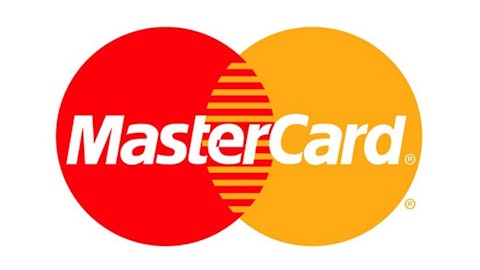Over the past few weeks, shares of Visa Inc (NYSE:V) have recovered modestly on news that the Federal Reserve will appeal U.S. District Court Judge Richard Leon’s ruling that the current cap on debit card transactions of $0.21 was inconsistent with the intent of the Durbin Amendment. Between now and the appeal, it seems likely that debit card caps will remain at $0.21 per transaction.
Bad idea from the start?
Because Visa Inc (NYSE:V) and rival Mastercard Inc (NYSE:MA) have often been the targets of regulatory scrutiny, it seems unlikely that any government-affiliated organization would show support. However, the Fed may be well-aware of the unintended consequences of the debit card transaction fee cap, which actually regulates interchange fees (the fees are collected by Visa and MasterCard but given to the card issuers/banks).

For one, consumers lost free checking, a staple of banking throughout the growth of debit payments. Although many banks offer a number of ways to acquire free checking (minimum balances, direct deposit, etc.), there are undoubtedly consumers who have been forced out of traditional banking and into different means, like pre-paid cards from places ranging from payday loan shops to Wal-Mart.
The other consequence is what did not occur: lower prices. Part of Senator Dick Durbin’s rationale behind capping transaction fees centered on the argument that mom-and-pop retailers would be relieved of the cost and that large retailers would generously lower prices. Yet, Durbin did not account for sticky prices, or for the likely scenario that retailers would simply keep prices flat (or even raise prices) boosting operating margins.
What could happen?
As is often the case with legal issues, there are several scenarios that could occur.
The most probable outcome could be that the cap will stay at $0.21 per transaction (prior to the Fed’s setting of debt-transaction fees, issuers were charging merchants more than double that level). Interchange fees are collected by Visa Inc (NYSE:V) and Mastercard Inc (NYSE:MA) on the behalf of card issuers. Visa and MasterCard would obviously prefer a higher cap, but the $0.21 amount is certainly high enough to please banking customers.
Banks also would prefer a higher cap, but the likes of JPMorgan Chase and Bank of America have already worked to “uncap” credit card spending, and they seem unlikely to start going against spending as a result of any change. Retailers may not love the cap, especially considering the National Retail Federation sued over the $0.21 cap, but debit card fees are about half of what they averaged prior to the ruling, so all other things constant, retailers are making more money now.
Another scenario that makes sense involves keeping a cap but lowering take-rates on very small transactions. Given the growth of card transactions, many consumers prefer not to pay in cash, or might not even carry cash, with some paying exclusively with cards. Much of the gross margin on an item that costs just a few dollars can be eaten up by fees, so this would solve the issue for retailers. This scenario could be hard to sell to the payment companies and may not satisfy retailers.
The last scenario that could play out would be a new cap, either higher or lower. However, the odds of a higher cap seem slim. Frankly, the Fed may not have much sympathy for companies that have operating margins in the 50% to 65% range like the credit card network providers. If this were to happen, the National Retail Federation would likely intensify legal efforts, and the future of fees would remain uncertain.




